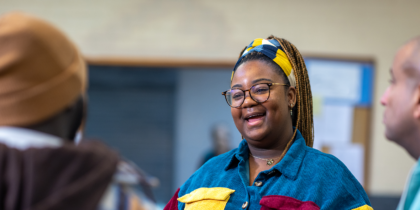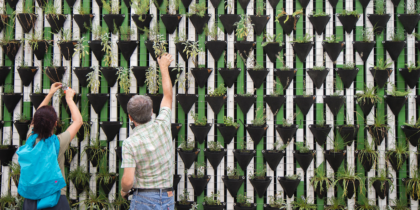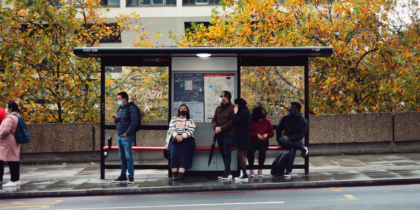By David Wooodhead
This is how we do workshops nowadays. Gone are chairs arranged in circles, flip charts on stands, post it notes and brightly coloured markers. Now it’s chat boxes and virtual break-outs, raised hand icons, and the often-shouted, ‘you’re on mute!’.
People arrive, one by one, until there are eight faces staring up at me from my laptop screen. In the silence, they variously take the last mouthfuls of tea from their mugs, check they have a pen that works, catch sight of themselves, adjust their hair, pout. And chat.
One of them has been looking after a neighbour’s dog. Another is getting ready for a week in Wales. Work is full on – when isn’t it? – but they’re making progress. There’s a comment about football that I don’t understand. And another about politics, which I do. And subdued laughter.
‘Good morning’, I say, interrupting the chat. ‘Thanks for coming. I’m David from Centre for Mental Health’.
Mark Trewin from Rethink Mental Illness, who is leading the session, is part of the national team in the community mental health unit. They are funded by Charities Aid Foundation to work in five sites – East Lincolnshire; Cheshire and the Wirral; Sheffield; Coventry and Warwick; and Tower Hamlets – to lead and support the development of local mental health alliances. The programme stems from a belief that collaboration across the voluntary and community sector will create opportunities to influence the priorities of integrated care boards and to access funding – a counterbalance to the larger providers who might currently attract the lion’s share of funding.
The participants, each of them a local leader in the project, introduce themselves. The task we share today, I explain, is to get our teeth into what is working in terms of building alliances and influencing local commissioning; what is getting in the way, what is local and contextual, and what can be generalised.
The workshop generates a number of learning points – useful for the programme but also for colleagues working in integrated care systems across the country.
- Integrated care boards provide new and renewed opportunities for voluntary organisations to develop their offer and provide effective mental health and wellbeing services for local communities, service users, and carers
- Patience and determination are key. Working in complex systems can be frustrating because progress is sometimes slow. However, taking time to build relationships is critical: moving too quickly can create issues further down the line. Organisations that have hitherto been in competition are being asked to collaborate. This is a culture shift for many
- Trust and willingness to collaborate – and, on occasion, compromise – are critical. Progress is most evident in places where relationships between VCSE organisations, and between them and local commissioners, are well-developed and mature
- Context is everything. Backing local solutions is more productive than prescribing fixed approaches. While all the local alliances have principles and values in common, implementation varies from place to place. Therefore, success measures have to be produced and owned locally
- Coproduction is essential but it takes time to get right. There is a lot of experience in this area in the voluntary and community sector, but there is still much to learn. When done well, coproduction holds service users’ and carers’ voices at the centre of alliances’ plans, maximising their relevance and long term successes
- Tackling systemic discrimination, including racism, is a central priority. Close engagement with people from racialised and other marginalised communities, including people with lived experience, is key.
Aside from what they say, and their obvious insight into their local areas, there is something very striking about the people in the workshop, something that evaluators, myself included, struggle to describe.
There is passion bouncing off them, and a deep empathy. They have a lot of energy for the work, despite the arduous task of working amidst challenging dynamics borne of years of statutory sector commissioners not listening to voluntary sector colleagues, inhibited by long-held judgements about what is, and isn’t, achievable.
The workshop participants speak from a place of personal commitment, from a belief in the assets that communities have, from their optimism that alliances can help improve the lives of local people, of service users, and carers.
And finally, I ask, ‘what is the biggest challenge you face?’
‘Convincing ICB leaders to create enough space for the alliances at the decision-making table’, I am told. ‘But we are going to do it. Just watch’.
These are the findings from the five community mental health sites that Rethink Mental Illness are funded to support by Charities Aid Foundation. In September Rethink will be publishing research they have undertaken across England which sets out more detail on best practice and challenges.








